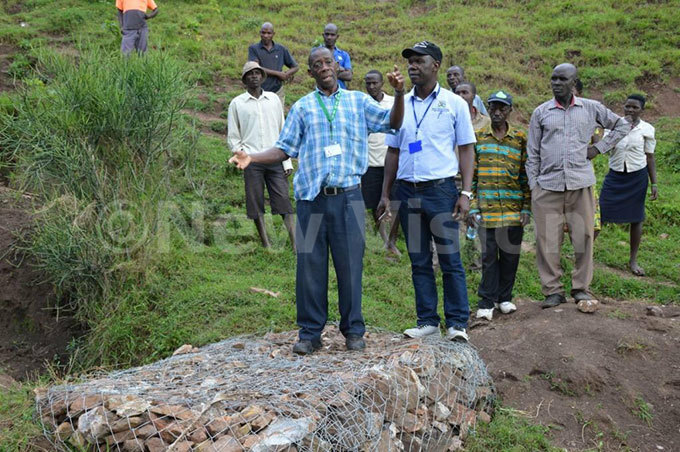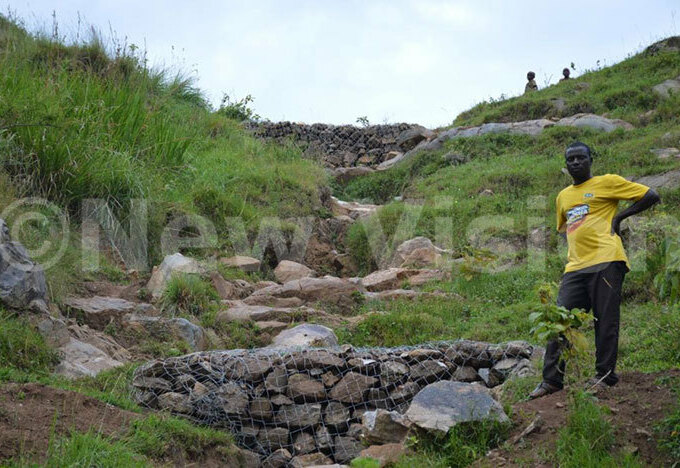Water ministry embarks on strategies to save River Rwizi
Richard Musota, the Principal Water Officer in the directorate of water resources management in the Ministry of Water and Environment on Tuesday during a guided tour to assess restoration efforts on River Rwizi catchment areas said the catchment loses 1,386 million cubic meters of rain water every year.
ENVIRONMENT
MBARARA-In a bid to save River Rwizi, the Ministry of Water and Environment has embarked on water retention interventions in upland catchment areas to save river Rwizi that is threatened with extinction.
This move has started with construction of water conservation structures that include earth and stone bunds, retention beaches, gabions and trenches in the upland catchment areas of this river in a bid to increase water storage in the soil so that water is available in wet and dry seasons.
Richard Musota, the Principal Water Officer in the directorate of water resources management in the Ministry of Water and Environment on Tuesday during a guided tour to assess restoration efforts on River Rwizi catchment areas said the catchment loses 1,386 million cubic meters of rain water every year.

Jeconius Musingwire and Richard Musota, the water officer standing at one of the gabions created to regulate water flow in the upland of Kamukaki Parish in Buhweju
"When it's a wet season we receive too much rain causing havoc like floods and runoffs but this is followed by dry season that is very extreme with no water in the river system so we have now come out and to invest in interventions of holding water in the catchment and so far we are progressing well," said Musota.
He said at the start of the interventions last year, there was a lot of resistance from the community members but later on they got on board.
He said they have already spent sh450m in constructing of water conservation structures.
In Rubara, Nsiika town council in Buhweju district they have spent sh150m, in Masyoro, Kyangyenyi sub county in Sheema district have spent sh170m as well as in Nyakambu swamp and Kabingo, Kabingo town council in Isingiro district.
Musota revealed that unless serious interventions and regulations of water flow are put in place by the year 2025, River Rwizi will be no more because there is much demand for water.
"What we have done to save this river especially restoration of catchment area is very little and a lot of work is still needed to save this river by every stakeholder," said Musota.
He added that when this rain water is retained in the soil it will be able to maintain the water volumes of River Rwizi even in dry seasons.
 A view of gabions created in the gullies to regulate water flowing down the mountains
A view of gabions created in the gullies to regulate water flowing down the mountains
He further revealed that the process of demarcating the protection zone of River rwizi in Mbarara Municipality is being undertaken to plant pillars and restoration of the river banks.
Jeconious Musingwire, the Western/Masaka Regional Officer said the problem of River Rwizi catchment starts with the hilly and mountainous areas which call for restoration and retention of water volumes both in upland, mid slopes and lower catchment areas.
"If you tap water surface run off, you will recharge river lands and increase water in granaries of wet lands ,we are looking at a bigger approach of saving this river from extinction," he said
"For example in Nyakambu swamp in sheema over 118 acres had been encroached and it was majorly farms and gardens in 2016 where residents had started tilling for crop production and they had dug drainage channels to completely kill the swamp but when we embarked on the campaign, the swamp is back and the residents are appreciating now"
Juliet Kamukama, the parish councilor for Kamukaki, in Kalungu sub country said the intervention by the ministry besides targeting increase water volumes in RIver Rwizi has benefited communities in retaining soil fertility and taming floods among others.
Benard Bagombeka also a resident of Kamukaki narrated that prior to the intervention by the ministry this year, they were experiencing floods that would destroy crops, banana plantations and homes due to water runoffs from upland.
"But since the ministry came in with Advocates Coalition for Development and Environment (ACODE), they helped us so much and I can confirm that we no longer experience such disasters, they taught us how to dig ditches in our plantations and now our soils have regained its fertility" Bagombeka noted.
River Rwizi which covers approximately 8200 km is the source of water for livelihood to both human and animals in the districts of Rakai, Lyantonde, Isingiro, Lwengo, Kiruhura, Mbarara, Bushenyi, Buhweju, Sheema and Rubirizi districts.
But it is threatened with extinction as water tides continue to drastically reduce due to encroachment on the river catchment areas through human activity.